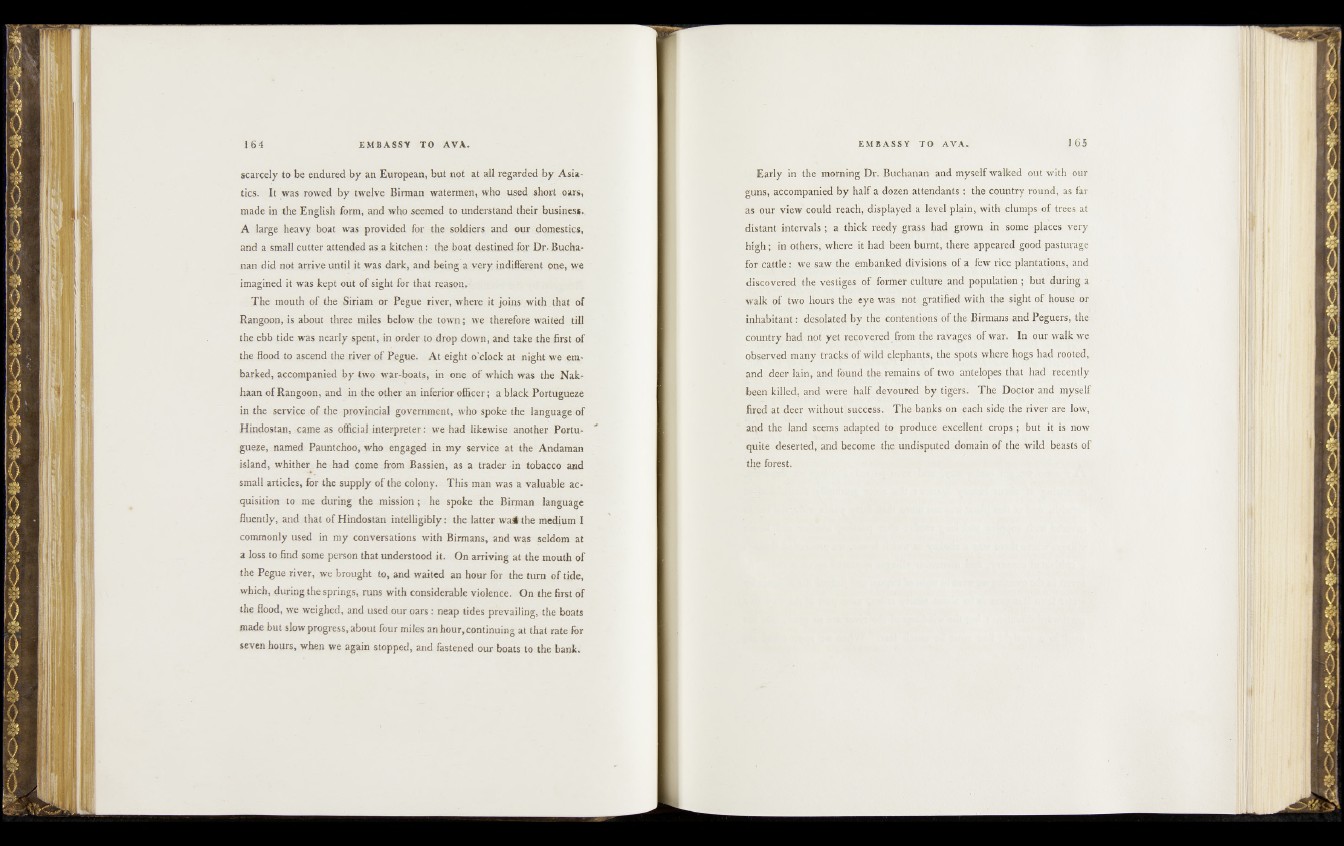
scarcely to be endured by an European« but not at ail regarded by Asiatics.
It was rowed by twelve Birman watermen, who used short oars,
made in the English form, and who seemed to understand their business.,
A large heavy boat was provided for the soldiers, and our domestics,
mid a small cutter attended as. a kitchen: the boat destined for Dr- Buchanan
did not arrive until it was dark, and being a very indifferent one, we
imagined it was kept out of sight for that reason*'
The mouth of the Siriam or Pegue river, where it joins with .that of
Rangoon, is about three miles below the town 5 we therefore waited till
the ebb tide was nearly spent, in order to drop down, and take the first of
the flood to ascend the .river pf Pegue. At eight o’clock at night we embarked,
accompanied by two war-boats, in one of which was the Nak.-
haan of Rangoon, and in the other an inferior officer; a black Portugueze
in the service tof the provincial government, who spoke the language of
Hindostan, came as official in te rp r e te rw e had likewise another Portuguese,
named Pauntchoo, who engaged in my service a t the Andaman
island, whither he had come from JBassien, as a trader in tobacco and
small articles, for the supply of the colony* This man was U valuable a c quisition
to me during the mission; he spoke the Birman language
fluently, and that of Hindostan intelligibly: the latter wa#the medjmri I
commonly used in my conversations with Birmans, and was seldom at
a loss tofind gome person that understood it. On arriving at the mouth of
the Pegue river, we brought to, mid waited an hour for the turn of tide,
which, during thesprings^ runs with considerable violence. On the first of
the flood, we weighed, and used our o ars: neap tides prevailing, the boats
made but slow progress, about four miles an hour, continuing at that rate for
seven hours, when we again stopped, and fastened our boats to the bank.
- Earli&in' the-morning HfBiirhanafi* a^id mysolfev alked put with ’our ,
guns, accompanied by*,ha]$^dozen,attendants: the countryfjrctti^d-M^far
as our view' could’-reach, displavuctoiivlmcl plain, with clumps offices at
distant intervals; a-thick reedy,.gras.s. fi%d grown in some places very
high; inf of hers, where it>fiad^b,peiaiburnt'iltjieraiapp,eai;ed;>goo(lfpasturage
for (ca||fe: e saw the embanked divisions, oi a,lew,1 ice plantations, and
jdisgoveied'thq vestiges of , fpnner,,culture and popuIati®n : rDut during a
wajk of 1hoifes..ths3ie.msw%S* Jiotag 1 added with.jthertsighl oj house; or
inhabitant: desolated by the ccdrrtejdisnsi pf, the'Birmans and Ifegu^rs, the
ccffintiy hadj'npt yet recovered fiom the i^jigyujoijivvar. I11 0111,walk w ||
observed,man-y Cracks' of wild^ephMtS,' the.1pidfejA'rhere' hog^ had-rod'tedr
ta-nd .deer lain'; and found the, remains of two,„antelopes that JiadhreceutLy.'
been killed, and were half devoured- tigers.1 The Doetofaand myself
fired atudeej without]sp,cccss. . j'he banks on.-each side the river azp few,
and the land seems adapted tq produce,-excellent?crops,,;.',hut it .is rtoi%-
quite deserted, and become the undisputed dstnmmpf the wild,beasts of
the forest. ■ ■